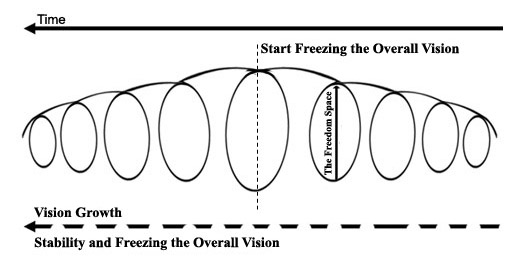Deadlines are pushy and affect our creativity by limiting the time and stressing our nerves; creative people always suffer with deadlines and hate that word. However, in most cases, deadlines should be respected in some way or other; and regardless of the financial sides, deadlines are there somehow for rational reasons, and the most obvious one is to maintain a minimum level of order.
So, if you are a creative person, here I share with you 3 tips about how to respect your deadlines through the dynamics of the creative process itself.
We start the process with a clear idea in our minds, but we need freedom to develop it. This freedom and the unbounded development lead to some kind of confusion, which leads to chaos unless it is being handled properly and early enough. That confusion makes you feel the need to settle things again and re-enforce order; and that is when you start to make proper arrangements and follow some kind of procedures to control the flow of work. However, after some time, this leads to some kind of bureaucracy that weakens our creativity and pains our nerves. If we did not fix things fast enough, our creativity would suffocate to death. That is why we just move again to freedom and so on. It is a loop or game of achieving a dynamic balance all the time between order and freedom.

These jumps between the phases of freedom and organizing usually take place after we pass some point that we can call the peak of the phase where we reach the maximum of our productivity per time unit, and the curve starts to flip.

We also start a creative process with certain ideas, but it rarely happens that we end up with the same ones. We keep developing, building parts, and destroying others as a response to our instantaneous feeling of satisfaction about the overall results. In many creative industries, such processes are simply indicated by loops, and with each new loop, we understand our vision more and more. As we advance from one loop to another, the final product starts to take its stable final form gradually.
Freedom phases are usually where we build new parts and ideas. In the re-organizing phase, we do destroying and re-factory missions to cut the tails and remove all unnecessary parts that confuse our new overall vision.
However, to prevent the failures of your creative processes and to be able to respect your deadlines, you must keep in mind the first advice I have for you today. You should always have the right sense to know when to stop changing the vision and start freezing the outer frame of your product or ideas. You need that so you can keep building on solid ground and avoid sinking in endless changes where you get distracted by the race of thoughts and by that hungry and greedy monster inside you who wants to do everything at the same time, even if they are just contrary sometimes.
The second piece of advice is to keep the balance between moving vertically and horizontally, between sinking vertically at a certain point, and moving horizontally toward the finish line. This would need you to understand that it is important to sacrifice some ideas to be able to keep moving horizontally.

Actually, this point is one of the major non-financial reasons for why deadlines are being set. Without some kind of deadlines that are being set in some way or other, creative people tend to sink vertically deeper and deeper. That might be beneficial, but it would make finishing any initial plans almost impossible.

The last piece of advice here is to learn when it is time for perfection, and when it is time to let it go. The disease of seeking unnecessary perfection comes with creativity together in one package most of the time. However, in about 95% of the cases, 95% of quality is more than enough. Unless you are designing a protection system for something nuclear or directly related to protecting human life or an enormous amount of money, then seeking the 100% quality level is simply insanity or driving you toward it. The funny thing here is that this last 5% usually consumes an enormous amount of your time and energy that can be equal or even more than that had been spent in the first 95%. You should learn to know when it is enough... when it is time to stop. In other words, you should learn to pick the proper level of perfection needed considering the circumstances. It is the necessary balance between creativity, ability, and reality.
Creativity
ENG








